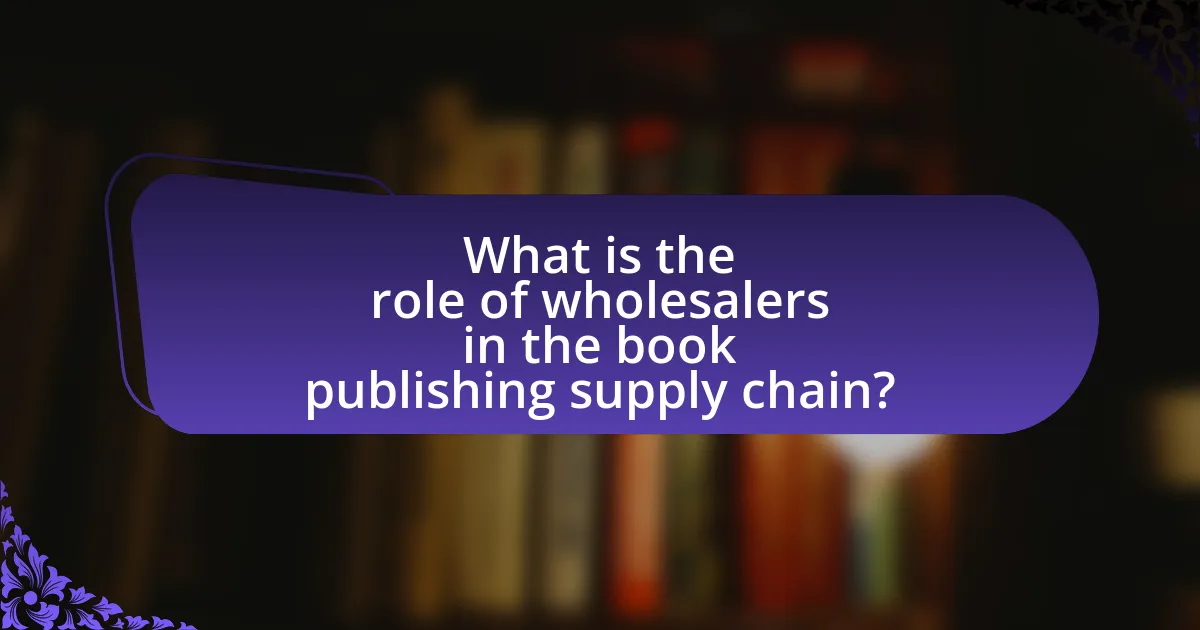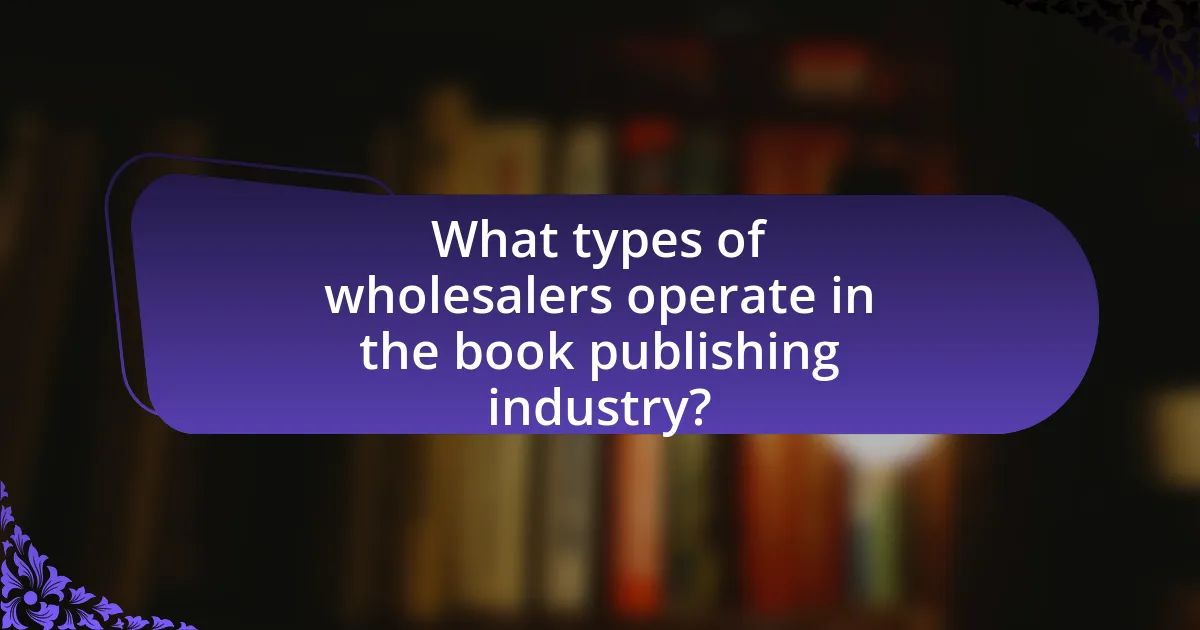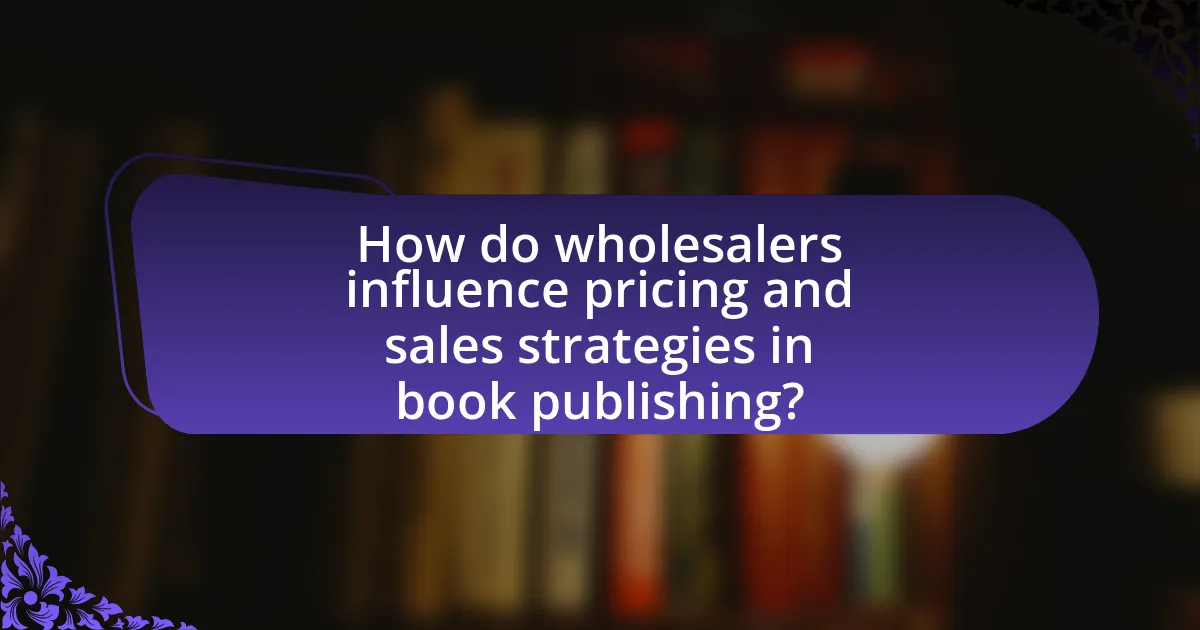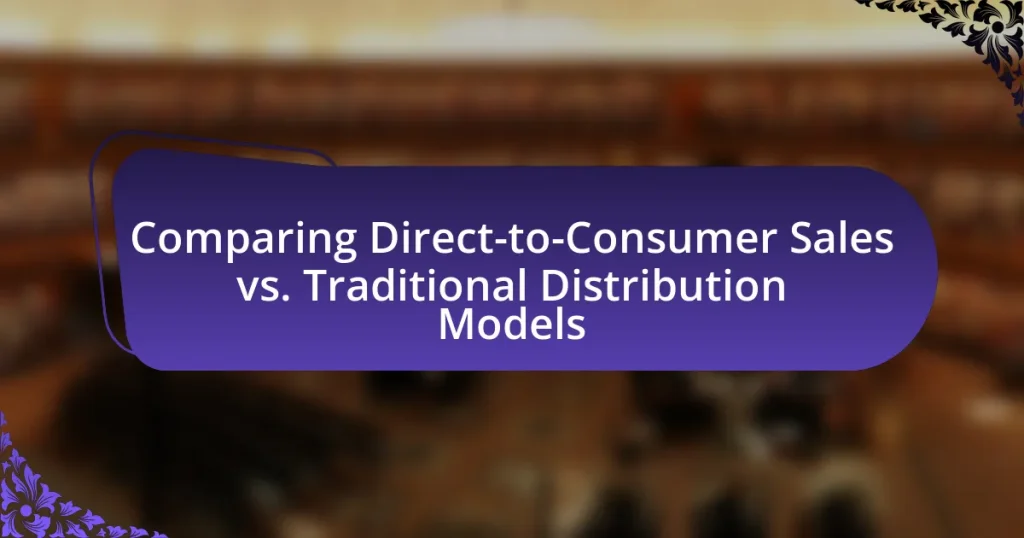Wholesalers serve as vital intermediaries in the book publishing supply chain, facilitating the distribution of books from publishers to retailers. They engage in bulk purchasing, manage logistics, and provide inventory solutions, which streamline operations and enhance market access for both publishers and retailers. The article explores the various roles and functions of wholesalers, including their impact on pricing strategies, sales volume, and market diversity. It also examines the different types of wholesalers, their interactions with publishers and retailers, and best practices for collaboration, ultimately highlighting the significant influence wholesalers have on the efficiency and effectiveness of book distribution.

What is the role of wholesalers in the book publishing supply chain?
Wholesalers play a crucial role in the book publishing supply chain by acting as intermediaries between publishers and retailers. They purchase large quantities of books from publishers, allowing publishers to focus on production and marketing while ensuring that retailers have access to a diverse inventory. Wholesalers also manage logistics, including storage and distribution, which helps streamline the supply chain and reduce costs for both publishers and retailers. This function is supported by the fact that wholesalers often have established relationships with various retailers, enabling them to efficiently distribute books across different markets.
How do wholesalers fit into the overall book publishing process?
Wholesalers play a crucial role in the overall book publishing process by acting as intermediaries between publishers and retailers. They purchase books in bulk from publishers, which allows publishers to focus on production and marketing while ensuring that books are distributed efficiently. Wholesalers manage inventory, provide warehousing, and facilitate the logistics of getting books to various retail outlets, thus streamlining the supply chain. This function is essential because it enables smaller retailers to access a wide range of titles without needing to purchase directly from multiple publishers, which can be logistically challenging and costly.
What are the key functions of wholesalers in this supply chain?
Wholesalers in the book publishing supply chain primarily perform the functions of bulk purchasing, storage, distribution, and market access. They buy large quantities of books from publishers, allowing for economies of scale, which reduces costs for both publishers and retailers. By storing inventory, wholesalers mitigate the risk of stockouts for retailers and ensure a steady supply of books. Additionally, they distribute books to various retail outlets, enhancing market reach and accessibility. Wholesalers also provide valuable market insights and trends, helping publishers make informed decisions about production and marketing strategies. These functions collectively streamline the supply chain, improve efficiency, and facilitate the flow of books from publishers to consumers.
How do wholesalers interact with publishers and retailers?
Wholesalers interact with publishers and retailers by acting as intermediaries that facilitate the distribution of books. They purchase large quantities of books from publishers at discounted rates and then sell them to retailers, often providing additional services such as inventory management and marketing support. This interaction streamlines the supply chain, allowing publishers to reach a broader market while enabling retailers to access a diverse range of titles without the need for direct relationships with multiple publishers. Wholesalers also help manage logistics, ensuring timely delivery and reducing the burden on both publishers and retailers.
Why are wholesalers important for book distribution?
Wholesalers are crucial for book distribution because they act as intermediaries between publishers and retailers, facilitating the efficient movement of books to the market. They consolidate inventory from multiple publishers, allowing retailers to access a diverse range of titles without needing to manage relationships with each individual publisher. This streamlining reduces costs and increases the speed of distribution, as wholesalers can leverage economies of scale to negotiate better shipping rates and manage logistics more effectively. According to the Book Industry Study Group, wholesalers account for approximately 40% of book sales in the U.S., underscoring their significant role in ensuring that books reach consumers efficiently and effectively.
What advantages do wholesalers provide to publishers?
Wholesalers provide several advantages to publishers, primarily through efficient distribution and inventory management. By acting as intermediaries, wholesalers enable publishers to reach a broader market without the need for extensive logistics and warehousing. This reduces the burden on publishers to manage stock levels and shipping logistics, allowing them to focus on content creation and marketing. Additionally, wholesalers often have established relationships with retailers, which can lead to increased sales opportunities for publishers. According to the Book Industry Study Group, wholesalers account for approximately 30% of book sales in the U.S., highlighting their significant role in the distribution process.
How do wholesalers enhance the availability of books to consumers?
Wholesalers enhance the availability of books to consumers by acting as intermediaries between publishers and retailers, ensuring a steady supply of titles. They purchase large quantities of books from publishers, which allows them to stock a diverse range of titles and genres. This bulk purchasing reduces costs, enabling wholesalers to offer competitive pricing to retailers. Additionally, wholesalers manage inventory and distribution logistics, ensuring that books are readily available in various retail locations. According to the Book Industry Study Group, wholesalers account for approximately 30% of book sales in the U.S., demonstrating their significant role in maintaining book availability for consumers.

What types of wholesalers operate in the book publishing industry?
In the book publishing industry, there are primarily three types of wholesalers: trade wholesalers, specialty wholesalers, and mass market wholesalers. Trade wholesalers distribute books to retailers and libraries, often handling a wide range of titles and genres. Specialty wholesalers focus on niche markets, offering specific categories of books, such as academic or children’s literature. Mass market wholesalers distribute books in bulk to discount retailers and supermarkets, emphasizing high-volume sales of popular titles. These classifications are essential for understanding the distribution dynamics within the book publishing supply chain.
How do different types of wholesalers serve the publishing market?
Different types of wholesalers serve the publishing market by facilitating the distribution of books from publishers to retailers and other end-users. Full-service wholesalers, for instance, provide a comprehensive range of services including inventory management, marketing support, and order fulfillment, which helps publishers reach a wider audience efficiently. On the other hand, specialized wholesalers focus on niche markets, such as academic or genre-specific titles, ensuring that targeted retailers receive the appropriate inventory tailored to their customer base. Additionally, online wholesalers leverage digital platforms to streamline ordering processes and expand market reach, reflecting the growing trend of e-commerce in book sales. These varied approaches enable wholesalers to effectively meet the diverse needs of the publishing industry, enhancing overall supply chain efficiency.
What are the characteristics of large-scale wholesalers?
Large-scale wholesalers are characterized by their ability to handle significant volumes of goods, which allows them to benefit from economies of scale. They typically maintain extensive inventory levels, enabling them to meet the demands of various retailers efficiently. Additionally, large-scale wholesalers often have established relationships with multiple suppliers and manufacturers, facilitating a diverse product range. They also utilize advanced logistics and distribution systems to ensure timely delivery and minimize costs. According to the National Association of Wholesaler-Distributors, large-scale wholesalers account for a substantial portion of the wholesale distribution market, emphasizing their critical role in supply chains, including the book publishing sector.
How do independent wholesalers differ from larger counterparts?
Independent wholesalers differ from larger counterparts primarily in their operational scale and flexibility. Independent wholesalers typically operate on a smaller scale, allowing them to adapt quickly to market changes and customer needs, while larger wholesalers often have more rigid structures and processes due to their size. For instance, independent wholesalers can offer personalized service and niche products that cater to specific audiences, whereas larger wholesalers may focus on mass distribution and standardized offerings. This flexibility enables independent wholesalers to build closer relationships with publishers and retailers, enhancing collaboration and responsiveness in the book publishing supply chain.
What role do specialized wholesalers play in niche markets?
Specialized wholesalers in niche markets serve as critical intermediaries that connect publishers with specific consumer segments, ensuring that unique products reach targeted audiences effectively. They possess in-depth knowledge of the niche market, allowing them to curate and distribute specialized titles that may not have broad appeal but are essential for particular demographics. For instance, in the book publishing supply chain, specialized wholesalers focus on genres like academic texts, rare books, or specific cultural literature, which require tailored marketing strategies and distribution channels. Their expertise enables them to manage inventory efficiently and provide valuable insights into market trends, ultimately enhancing the visibility and accessibility of niche publications.
How do specialized wholesalers cater to specific genres or audiences?
Specialized wholesalers cater to specific genres or audiences by curating and distributing books that align with the interests and preferences of targeted market segments. They achieve this by conducting market research to identify trends and demands within particular genres, such as romance, science fiction, or educational materials. For instance, specialized wholesalers may stock niche titles that mainstream distributors overlook, ensuring that independent bookstores and specialty retailers have access to unique offerings that resonate with their clientele. This targeted approach not only enhances the visibility of specific genres but also supports authors and publishers who focus on these niches, ultimately fostering a diverse literary landscape.
What impact do specialized wholesalers have on market diversity?
Specialized wholesalers significantly enhance market diversity by providing access to a wider range of niche products and catering to specific consumer preferences. These wholesalers focus on particular genres or categories, such as academic texts or independent publications, which allows them to serve diverse market segments that may be overlooked by larger distributors. For instance, specialized wholesalers can stock titles from small presses or self-published authors, thereby increasing the variety of available literature. This diversification not only enriches the consumer experience but also fosters competition among publishers, encouraging innovation and the introduction of unique content into the market.

How do wholesalers influence pricing and sales strategies in book publishing?
Wholesalers significantly influence pricing and sales strategies in book publishing by acting as intermediaries between publishers and retailers, which allows them to negotiate bulk purchase discounts and set retail prices. This negotiation power enables wholesalers to determine the final pricing structure that retailers adopt, often leading to standardized pricing across various outlets. For instance, wholesalers typically purchase books at a discount from publishers, which can range from 40% to 60% off the retail price, allowing them to offer competitive pricing to retailers. Additionally, wholesalers often provide sales data and market insights to publishers, helping them adjust their pricing strategies based on consumer demand and market trends. This data-driven approach ensures that publishers can optimize their sales strategies to align with market conditions, ultimately influencing the overall pricing dynamics in the book publishing industry.
What pricing models do wholesalers use in the book industry?
Wholesalers in the book industry primarily use cost-plus pricing, volume-based pricing, and tiered pricing models. Cost-plus pricing involves adding a markup to the wholesale cost of books to determine the selling price, ensuring that wholesalers cover their expenses and achieve a profit margin. Volume-based pricing offers discounts based on the quantity of books purchased, incentivizing retailers to buy larger quantities. Tiered pricing establishes different price levels based on order size or customer type, allowing wholesalers to cater to various market segments effectively. These models are supported by industry practices that aim to balance profitability with competitive pricing in the book supply chain.
How do wholesalers negotiate prices with publishers?
Wholesalers negotiate prices with publishers primarily through bulk purchasing agreements and leveraging their distribution networks. By committing to purchase large quantities of books, wholesalers can negotiate lower prices per unit, which benefits both parties; publishers gain guaranteed sales while wholesalers increase their profit margins. Additionally, wholesalers may use market data and sales forecasts to demonstrate demand, further strengthening their position in negotiations. This approach is supported by the fact that wholesalers often have established relationships with multiple publishers, allowing them to compare pricing and terms, which enhances their negotiating power.
What factors influence the pricing strategies of wholesalers?
Pricing strategies of wholesalers are influenced by factors such as market demand, competition, cost of goods sold, and economic conditions. Market demand dictates how much customers are willing to pay, while competition affects pricing flexibility; wholesalers must consider competitors’ prices to remain attractive. The cost of goods sold, including production and shipping expenses, directly impacts the minimum price a wholesaler can set to maintain profitability. Economic conditions, such as inflation or recession, can also lead to adjustments in pricing strategies to align with consumer purchasing power and overall market trends.
How do wholesalers affect sales volume and market reach?
Wholesalers significantly increase sales volume and market reach by acting as intermediaries between publishers and retailers. They purchase large quantities of books from publishers, allowing publishers to benefit from economies of scale and reducing their distribution costs. This bulk purchasing enables wholesalers to offer competitive pricing to retailers, which can lead to higher sales volumes. Additionally, wholesalers have established relationships with a wide network of retailers, including independent bookstores and online platforms, thereby expanding the market reach of the books they distribute. For instance, according to the Book Industry Study Group, wholesalers account for approximately 30% of book sales in the U.S., illustrating their critical role in enhancing both sales volume and market access for publishers.
What strategies do wholesalers employ to maximize sales?
Wholesalers maximize sales through strategies such as bulk purchasing, competitive pricing, and effective inventory management. By purchasing large quantities of books from publishers, wholesalers can negotiate lower prices, which allows them to offer competitive pricing to retailers. This pricing strategy attracts more retailers, increasing overall sales volume. Additionally, effective inventory management ensures that wholesalers maintain optimal stock levels, reducing the risk of stockouts and enabling them to meet retailer demand promptly. According to a study by the National Association of Wholesaler-Distributors, efficient inventory practices can lead to a 20% increase in sales for wholesalers.
How do wholesalers expand the market reach for publishers?
Wholesalers expand the market reach for publishers by distributing books to a wide array of retail outlets, libraries, and educational institutions that publishers may not directly access. This distribution network allows publishers to penetrate diverse markets, including independent bookstores and international markets, thereby increasing sales opportunities. For instance, wholesalers often have established relationships with retailers and can leverage these connections to promote and sell a publisher’s titles more effectively than the publishers could on their own. Additionally, wholesalers typically manage inventory and logistics, enabling publishers to focus on content creation while ensuring that books are readily available to consumers.
What best practices should publishers consider when working with wholesalers?
Publishers should prioritize clear communication and establish strong relationships with wholesalers to ensure efficient distribution. Effective communication helps in aligning expectations regarding pricing, inventory levels, and promotional strategies. Additionally, publishers should regularly review sales data and market trends to optimize their inventory management and adjust their offerings based on wholesaler feedback. This practice is supported by the fact that publishers who maintain open lines of communication with wholesalers often experience improved sales performance and reduced stockouts, as evidenced by industry reports indicating that collaborative relationships can enhance supply chain efficiency.
How can publishers effectively choose the right wholesalers?
Publishers can effectively choose the right wholesalers by evaluating their distribution networks, pricing structures, and reputation within the industry. A thorough assessment of a wholesaler’s reach can ensure that books are accessible to target markets, while competitive pricing can maximize profit margins. Additionally, researching a wholesaler’s reputation through industry reviews and testimonials can provide insights into their reliability and service quality. For instance, a study by the Book Industry Study Group found that publishers who partnered with reputable wholesalers experienced a 20% increase in sales due to improved market penetration.
What strategies can enhance collaboration between publishers and wholesalers?
Effective strategies to enhance collaboration between publishers and wholesalers include establishing clear communication channels, implementing joint marketing initiatives, and utilizing data analytics for inventory management. Clear communication ensures that both parties are aligned on expectations, timelines, and market demands, which can lead to more efficient operations. Joint marketing initiatives, such as co-hosted events or promotional campaigns, can strengthen relationships and drive sales for both publishers and wholesalers. Additionally, leveraging data analytics allows for better forecasting and inventory management, enabling wholesalers to stock the right titles at the right time, thus reducing excess inventory and improving turnover rates. These strategies are supported by industry practices that demonstrate improved sales performance and operational efficiency when collaboration is prioritized.



